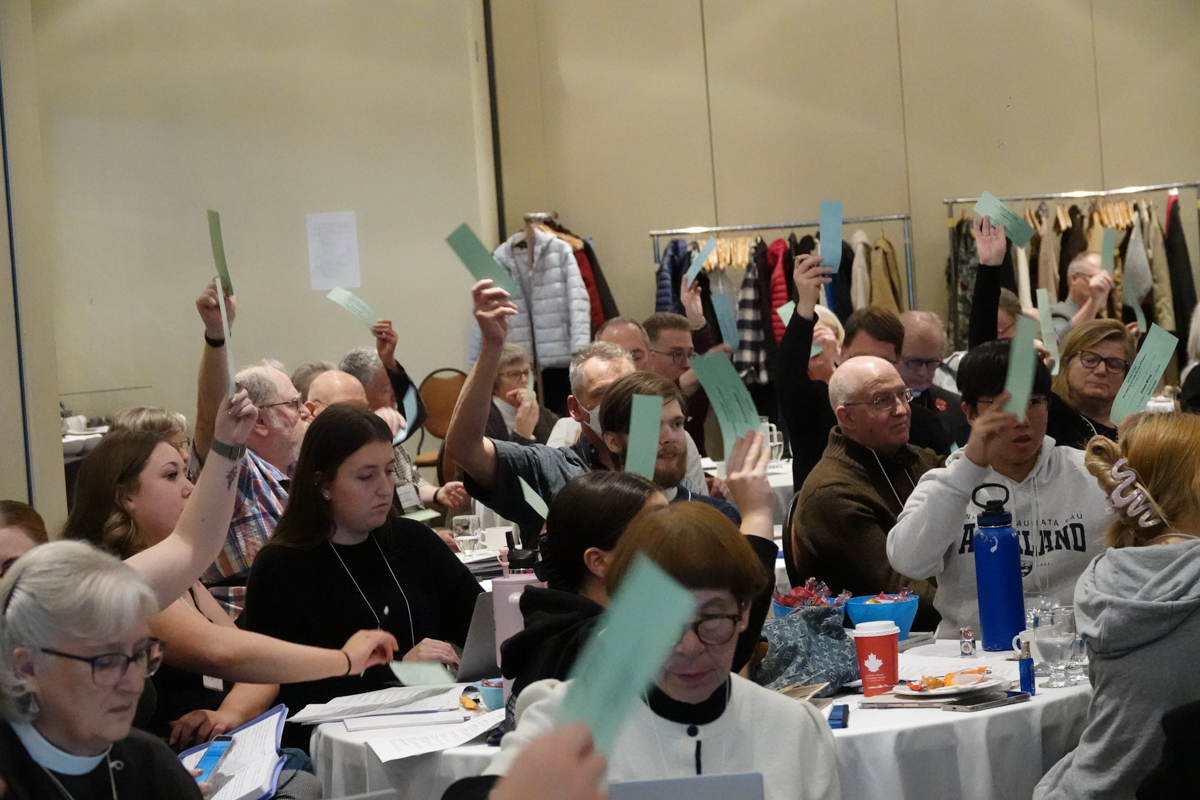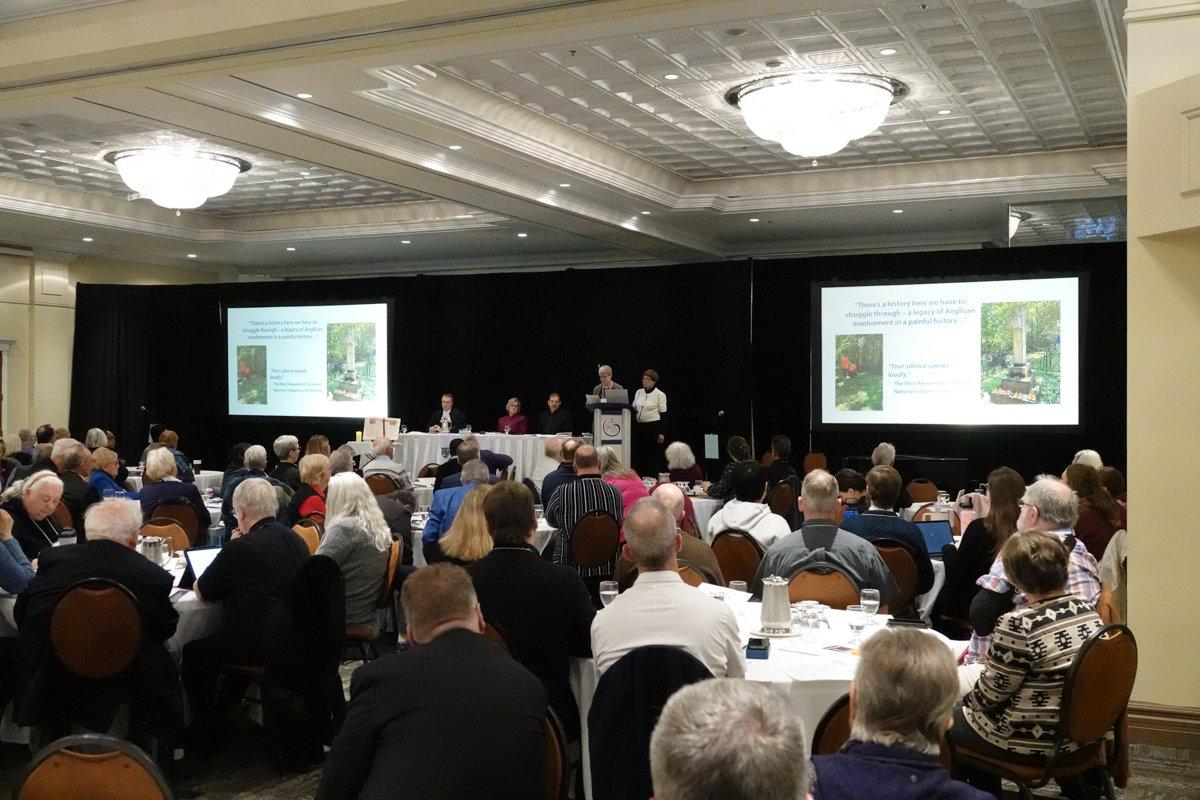150th Synod Sets the Groundwork for ‘Faith in the Future’
With a theme inspired by Jeremiah 29:11 members of Synod gathered for prayer, learning, discussion and decision-making.
Posted November 5, 2024
November 2, 2024, marked a historic moment in the Diocese of Niagara — its 150th Synod, as more than 200 people gathered at the Burlington Convention Centre.
After a warm welcome from Bishop Susan Bell and territorial acknowledgement, the Synod began with a gathering Eucharist, centred on the theme of 'Faith in the Future.
Bishop Bell then delivered her charge to the 150th Synod. In reflecting on the progress made since the COVID pandemic, the bishop delivered words of praise and gratitude for the faithfulness of Anglicans across the diocese. “Well done, Niagara” she said. "My essential - irreducible charge to you and to the faithful across our beloved diocese is this: keep your eyes firmly focused on Christ. Stay the course. Love God and love the world that God loves so much."
During her charge, Bishop Bell recognized the extraordinary priestly ministry of Garfield Adams, Ellie Clitheroe, Malcolm French, Naomi Kabugi, and Tom Vaughan, naming them in conjunction with Dean Tim Dobbin, as honorary canons of Christ’s Church Cathedral.
Dr. Emily Hill, parish development missioner, shared a presentation on the renewal of the diocesan Mission Action Plan. She acknowledged that the success of the current plan was possible because it was embraced together, as a whole, not only as a goal-setting tool but as a means of discerning God’s plan for the communities of the diocese. The Mission Action Plan (MAP) is designed to be a living process, always adapting and growing. “Here’s something to celebrate,” Hill said, “75% of parishes participated in the first MAP (2022-2024).”
 Looking forward, Hill shared the renewed priorities for MAP 2.0, keeping a Christ-centered focus on God’s mission as the top priority, followed by being a hope-filled and missionally-focused diocese.
Looking forward, Hill shared the renewed priorities for MAP 2.0, keeping a Christ-centered focus on God’s mission as the top priority, followed by being a hope-filled and missionally-focused diocese.
The process to renew the diocesan MAP gathered feedback from focus groups, surveys, prayer, and active listening. While the vision of the diocese remains the same (Called to Life – Compelled to Love), a minor revision to the diocesan’s mission statement was made. It is now: “Ignited by the irresistible love of Jesus and renewed by the Holy Spirit, we partner with God to deepen faith, join God’s mission, and care for God’s world.” Members of synod voted in wholeheartedly in favour of the motion to affirm the renewal of the diocesan Mission Action Plan.
Following this inspiring moment, Chancellor Greg Tweney, and Archdeacon Bill Mous brought forward two proposed canon changes. Amendments to Canon 2.8 regarding the diocesan budget, and Canon 3.2 regarding Licensed Lay Workers were both carried.
Dr. Scott Brubacher, executive director of the Anglican Foundation of Canada, spoke about the amazing work the foundation supports across the Diocese of Niagara and the Anglican Church of Canada. Brubacher shared that since 2010, the Anglican Foundation of Canada has provided $410,000 in support to the diocese with grants focused on a variety of ministries.
In the afternoon, Bishop Bell welcomed Archbishop Linda Nicholls, recently retired primate of the Anglican Church of Canada, to speak on “This Anglican Communion of Ours.” The archbishop delivered an insightful perspective on the workings of the Anglican Communion drawing on her own inspiring, and thought-provoking experiences through her years of leadership and episcopal ministry.
 During the budget presentation, Archdeacon Peter Scott and Treasurer Christine Morrow highlighted how, through Diocesan Mission & Ministry contributions, parishes build up the whole of God’s Church and support God’s mission locally to globally. The treasurer noted that revenues are expected to increase in 2025 which reflects our recovery from the pandemic. On the expenditure side, significant efforts were made to maintain costs as much as possible while maintaining the diocesan ministry capacity. Due to draws on reserve funds generously given as legacy gifts, as well as a repayment of a mortgage, the diocese is projected to have an overall cash surplus in 2025.
During the budget presentation, Archdeacon Peter Scott and Treasurer Christine Morrow highlighted how, through Diocesan Mission & Ministry contributions, parishes build up the whole of God’s Church and support God’s mission locally to globally. The treasurer noted that revenues are expected to increase in 2025 which reflects our recovery from the pandemic. On the expenditure side, significant efforts were made to maintain costs as much as possible while maintaining the diocesan ministry capacity. Due to draws on reserve funds generously given as legacy gifts, as well as a repayment of a mortgage, the diocese is projected to have an overall cash surplus in 2025.
Members of Synod overwhelmingly passed the 2025 diocesan budget, representing an investment of 3.8 million dollars in ministry.
Deirdre Pike, diocesan program consultant for justice and outreach, and Bruce MacKenzie, chair of Climate Justice Niagara, spoke to Synod about the Communion Forest Initiative. Members learned how with the support of the Anglican Foundation of Canada, Green Venture, and Neighbourwoods, Climate Justice Niagara involved seven parishes this year in the initiative. The process begins with the tree inventory, measuring and assessing health, and developing plans to protect and support them. The presentation highlighted wonderful stories of development focusing on tree planting at St. Paul’s, Westdale; St. David’s, Welland; a partnership with St. Christopher’s and St. John’s in Burlington; and the planting of a mini forest of over 400 trees at St. Paul’s, Caledonia.
Amy Collard and Susan Little, two of Niagara’s ten-member delegation for the Provincial Synod, shared a report about the recent Synod in Sault St. Marie. Together, they reflected on the theme of the Provincial Synod, ‘Conversations at the Crossroads,’ and the three days of panel discussions, reports, and presentations. Amy Collard and Rob Towler will be representing the Diocese of Niagara for the next three years on the provincial executive council, along with Bishop Susan Bell.
In its final segment, Dean Peter Elliot joined the Synod via Zoom to engage members of Synod with the work of the Primate’s Commission on Reimagining the Church. After spirited table discussions on the Commission’s seven hypotheses, Archdeacon Bill Mous facilitated a brief report back. Members of synod shared that all the hypotheses would require considerable research, thought, discernment, and prayer. They suggested they might be reassessed with a more hopeful outlook to their impacts on the future. Archdeacon Mous encouraged everyone to complete the Commission’s public survey.
In other business, the Synod also affirmed the actions of Synod Council for the proceeding year and received the 2023 Auditors report and the audited consolidated financial statements. KPMG was appointed as the auditors for 2024. Members of Synod also elected a slate of candidates to serve on Synod Council for a two-year term: for the region of Brock, Canon Pat Davis; for the Greater Wellington region, John Laidlaw; for Hamilton-Haldimand, Bev Groombridge; for Lincoln, Byron Nicholson; and for Trafalgar, Canon Malcolm French.
The results of the online election for delegates to General Synod, happening next June in the Diocese of Huron, were also shared during Synod. Representing the Order of Clergy are Dean Tim Dobbin, Archdeacon Bill Mous, and Archdeacon Terry Holub. Representing the Order of Laity are Susan Little, Amy Collard, and Adam McNeil.
The Synod was made possible by the generous support of lead sponsor Ecclesiastical Insurance.
At the end of the day, Bishop Susan Bell gave her assent to all the acts and resolutions brought forward to the 150th Synod of the Diocese of Niagara. The bishop closed with words of gratitude and told members they are a blessing from God to this diocese, who so powerfully demonstrate that we truly are Called to Life and Compelled to Love.
Click here to view pictures of the Synod and anniversary dinner.
The Convening Circular and list of resolutions, the proposed budget, and other documents can be found by visiting niagaranglican.ca/synod/2024.